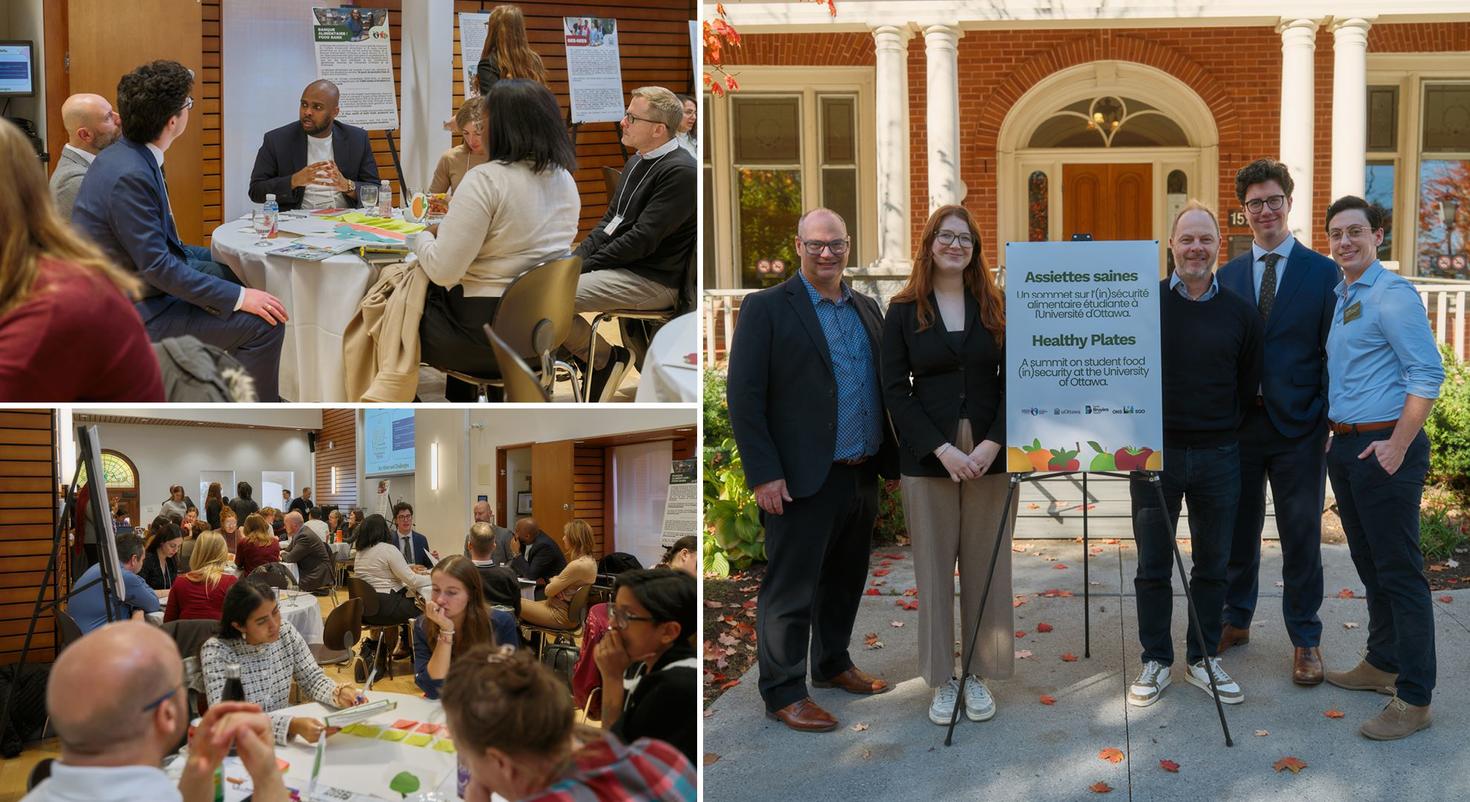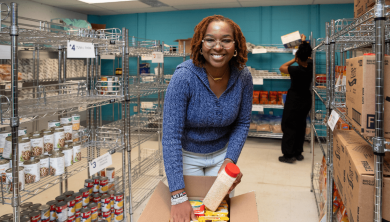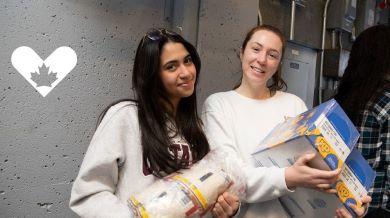A University-wide strategy is being developed as part of the Healthy Plates initiative, a collaboration between the University of Ottawa Students’ Union (UOSU), uOttawa and the Ottawa Neighbourhood Study at Bruyère Health Research Institute. Healthy Plates launched last year.
On October 28, the Healthy Plates Summit brought all partners together to share findings and hear directly from students, staff, faculty members and community partners. The aim is to co-create an actionable strategy to tackle food insecurity on campus.
In opening remarks at the summit, Éric Bercier, uOttawa’s associate vice-president, student affairs, said, “Food insecurity is a significant and complex issue, and it is not experienced equally. Some groups of students, such as international and racialized students, are disproportionately affected. We also learned that while many food-related programs exist, they operate largely in silos. These insights underscored the need for a more co-ordinated, equity-driven response.”
He added, “Addressing food insecurity is about more than meeting a basic need — it’s about advancing equity and supporting student well-being and academic success.”
Healthy Plates: Fact-finding first
The spring 2025 Canadian Campus Wellbeing Survey (CCWS) found that 13% of uOttawa students are considered severely food insecure, 18% are moderately food insecure and 42% are food insecure to some degree, according to Health Canada’s classification. The findings were part of a fact-finding step. The CCWS also found that international students were twice as likely as domestic students to be food insecure.
A fall 2025 survey of graduate students, conducted in partnership with the Graduate Students’ Association of the University of Ottawa (GSAÉD), found that almost half of respondents had cut meal sizes or skipped meals once or more in the past 12 months due to the cost of food. One in five reported going a whole day without eating due to lack of money.
Across Ontario, household food insecurity rose from 17% in 2019 to 24% in 2023, and that reality is mirrored on university campuses. Over 56% of post-secondary students in Canada grapple with food insecurity. Many struggle to afford balanced or nutritious meals, and some even skip meals due to lack of funds. The UOSU Food Bank has seen a 400% increase in demand over the past three years.
Focus groups consulted diverse student populations
Trained PhD students as well as professors Claire Kendall and Katherine Moreau led focus groups, meeting with diverse student populations to conduct a deeper dive into food access, financial stress and support services on campus. These focus groups explored barriers to access and ideas for improvement.
A report informed by discussions at the Healthy Plates Summit will identify priorities for action this December.
Summit attendees were asked to reflect on what a food-secure campus would look like, among other questions.
The next step: A strategy and action plan
The next step is to deliver an institutional strategy and action plan based on recommendations from all partners and examples of promising programs at other Canadian post-secondary institutions, such as integrated campus food hubs, meal-share programs, low-barrier financial supports and community partnerships.
Thoughts from student leaders at the Healthy Plates Summit
Jack Coen, president of the UOSU, says the student union funds the UOSU Food Bank, with top-up support from uOttawa, Chartwells (the contracted food service provider for the university’s dining operations) and individual donors. It also receives some stock at no cost from the Ottawa Food Bank network. And in winter 2025, the UOSU launched the Fed Up campaign, which offers free hot meals and free bags of groceries. However, he says the measures are in response to a crisis, and they’re insufficient to solve the issue.
“We’re trying all these different ways to fight food insecurity on campus, but we also know that our solutions are reactive to a crisis that has very foundational roots,” Jack says. “This crisis exists in a way that student unions by themselves are not set up to tackle.”
“The end goal is to create a campus where students are here to learn ... not wondering how they’re going to pay for their next meal … or whether they’re going to be worse off for their exam or study session because they’re on an empty stomach,” he adds.
Javier Armando Porras Gil, governance commissioner for the GSAÉD, says graduate students don’t have access to the Food Bank, but the GSAÉD does offer emergency food assistance ($50 to $250), grocery discounts and other initiatives.
“We really want to find a sustainable solution,” Javier says. “Hopefully, the strategy will include a concerted effort and a little more ownership to dedicate some space for this, or maybe even have some new funding models.... Even though graduate students were facing these problems, many did not know where to go — many of them didn’t know programs existed.”
Abraham Tabo, co-ordinator of the UOSU Food Bank, says, “We need more unity and joint leadership on this issue. The fact that the University is joining forces with student associations is truly ideal, as it will allow everyone to share ideas for solving a common problem.”
Some existing food-related supports at uOttawa
- UOSU Food Bank — Open three days a week, the Food Bank received more than 3,000 visits from students in 2024–2025. This past September, 657 students accessed food — a record amount.
- UOSU Fed Up campaign — Since it was launched in winter 2025, this campaign has given away more than 1,975 meals, including some cooked by students, in partnership with St. Albans Church and filled 1,065 free bags of fresh produce for students.
- Student Wellness — This team offers meal prep and nutrition workshops as well as, at times, free snacks.
- Gee-Gees Food Lounge — Since fall 2024, this initiative has been offering free athlete-friendly snacks to support performance with proper nutrition.
- Mashkawazìwogamig Indigenous Resource Centre — Around 25 students attend soup and bannock events every Thursday. Eight students attend a fridge and pantry cooking class each month.
- Free Food Alert — Since this program launched in November 2024, thousands of students have accessed free food left over after events on campus.
- People’s Republic of Delicious — This student club cooks rescued, donated food every Thursday.


